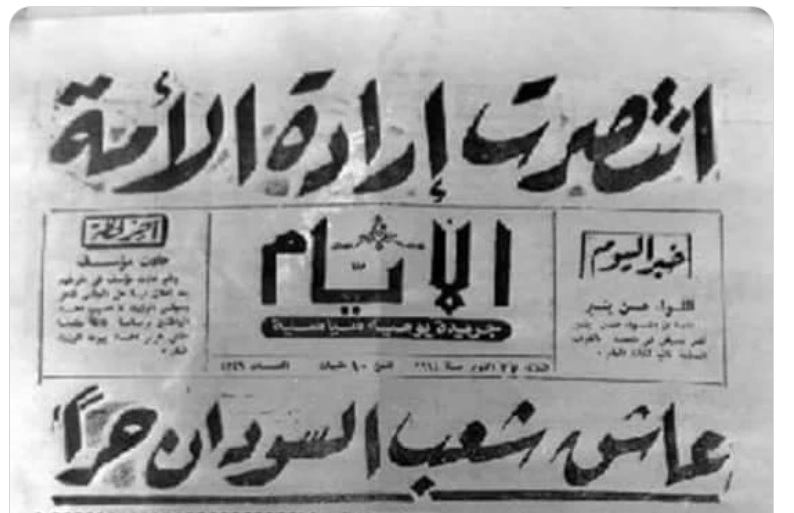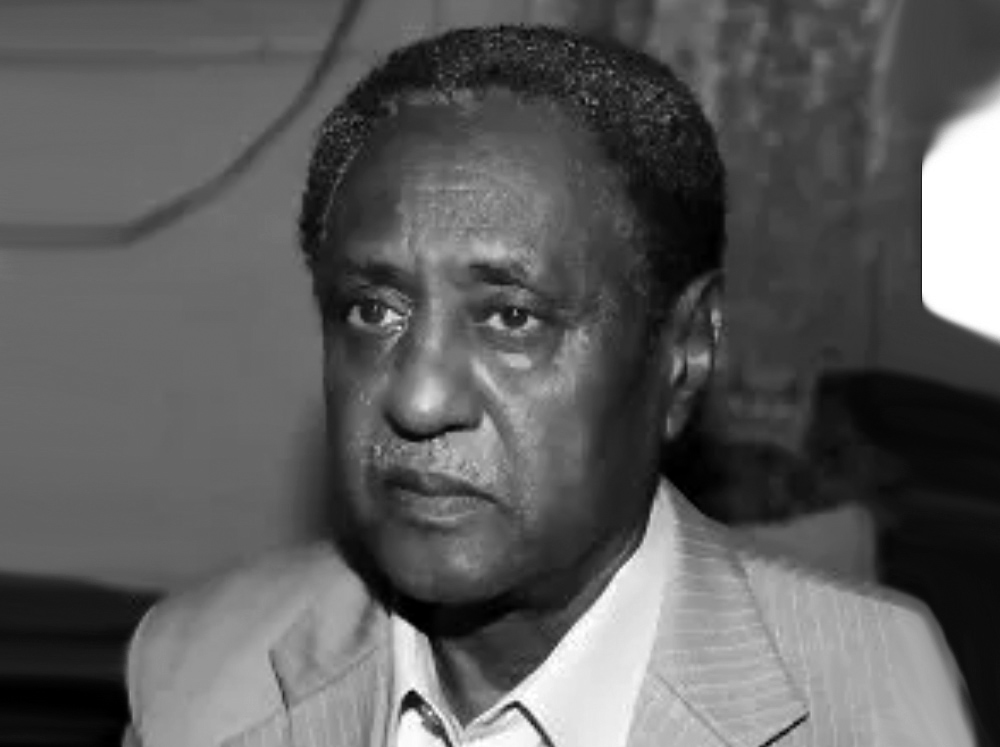
Al-Ayyam Days
By Sidiq Mihesi
In 1966, I officially joined the Al-Ayyam newspaper after being nominated by the late prominent journalist, Mohammed Mergani Sayed Ahmed, the bureau chief of Reuters agency in Khartoum.
Mohammed Mergani had an office in the old Abu Al-Ala building from which he managed his work and received prominent politicians. Among those who regularly visited him were Abdel Khaleq Mahjoub, the secretary of the Communist Party, Mohamed Ahmed Mahjoub, the Prime Minister, and Sherif Hussein Al-Hindi, the leader of the Unionist Party, along with many other political figures and societal stars. Their visits were for sharing news. I lived in a room in the same building, and I would visit him from time to time, and he would assist me with paying the room rent when I faced financial difficulties.
I entered the premises of Al-Ayyam with the belief that I would work in the literary section to practice writing poetry, short stories, and essays. However, as soon as I started my work, I began writing an article to demonstrate my writing abilities. But the editor-in-chief, Mahjoub Mohamed Saleh, laughed and returned my article, asking me to go to the Al-Ray Al-Am newspaper to contact a journalist named Tawfiq Saleh Gawish, who was responsible for police and court sections.
Mahjoub advised me to start with him as my first step towards this type of journalism. It was an entry point that anyone aspiring for this profession had to go through. Thus, I started a long journey, beginning with the police and judiciary departments. I ended up as a parliamentary and political editor, gaining practical experience that brought me closer to the true concept of journalism.
In Al-Ayyam, I was among the youngest, facing young journalists brimming with vitality and freshness. They were stars in the sky of words, a time when words carried weight and respect. Mustafa Amin, the editorial secretary, was a journalist beyond comparison, and the night guard of the building in Khartoum North, an enthusiast of hot-off-the-press newspapers, and the first to receive the infant Al-Ayyam as it emerged from the printing press.
Abdel Majid Al-Sawi, that young man with a handsome appearance, a cheerful disposition, and an elegant demeanor. He had a light stride, quick wit, and drove an Italian Fiat car during a time when only those of the aristocracy of pen and ink drove cars. Walid Ibrahim, with his bronze complexion, a light mustache shading his shy smile and his hushed voice, responsible for the literature section. He wrote short stories and translated for Othman Sibmain, Chinua Achebe, Wole Soyinka, and his adoration for Sharhabil Ahmed. He identified himself as a Sudanese African who spoke the Arabic language.
Fouad Abbas, that tall gate through which Sudans news reached the Arab world, a correspondent for Dar Al-Sayyad newspapers, one of the largest press institutions in Beirut. Mubarak Al-Rafi, the language reviewer in the newspaper, was a literary enthusiast and a follower of Abdulah El-Tayeb.
Omar Abdel-Tam, with a turban resembling ancient Persian drawings, no one witnessed what lay beneath it until he departed from our world in the 1980s. Abdel-Tam sat on the throne of sports in Sudan, directing his kingdom in Al-Ayyam. He enforced his journalistic justice among the clubs until he became an Imam of truth and trustworthy words. Bashir Mohamed Saeed says of him, Until Abdel-Tam left, not a single case of (Al-Ayyam) went to court, nor did we witness any retraction of a sports news, regardless of its age.
We were in (Al-Ayyam), at the bottom of the old Abu Al-Ala building in East Khartoum, a cluster of pens seized by ambition. Our respected teacher, Abdullah Rajab, the king of courageous journalism, carried English newspapers under his arm and sat translating them until evening approached.
Abdullah Rajab, the founder of the (Al-Sirah) which directed the battles of independence from its tower until colonization exited Sudan. That towers pillars were manned by leftist intellectuals: Abd al-Rahman Al-Wasila, Hassan al-Tahir Zuroug, Jafar al-Suri, Muhammad Abd al-Rahman Shiboun, Muhammad al-Hasan Ahmed, Saeed Ahmed Nokad Allah, Muhammad Saeed Marouf, and Mahjoub Mohamed Abd al-Rahman (The Leader).
In his application, Bashir Mohamed Saeed requested that he work in (Al-Ayyam), as a tribute to his long journey following the collapse of the (Al-Sirah), and his prolonged struggle with printing debts. This continued until the Ministry of Information, under Aboud, purchased it, transforming it into the New Al-Sirah, managed by Mahmoud Abulazim, ever ready to shake hands with any comprehensive system.
In (Al-Ayyam), among us was Az Eddin Osman, the caricature genius, searching for his artistic subjects among contrasting social classes. Drunkards vomiting sherry in front of bar doors, others leaning against walls late at night. Ministry agents known for their facilitations wandering through the alleys of pleasure at dusk. Horse-riding police officers parading before them, quarrelsome men with torn and bloodied clothes taken to police stations. Lawyers dancing at boisterous parties, including homosexuals from various cities like Kassala, Port Sudan, and others. Petty thieves with trade licenses, army officers smuggling hashish from the south, politicians with furrowed brows debating in Parliament in the morning and melting into the red taboos at night.
I also found in (Al-Ayyam) Dr. Ibrahim Omar Al-Tenei, responsible for the economics section, who migrated to the UAE where he worked as an expert in the economic department of Sharjahs Emirate and became responsible for the economic section of the Emirati newspaper Al-Bayan. Abd al-Basit Mustafa joined, working as an immediate translator for the African Unity Organization, and later came Othman Khalid, the late poet who caused a sensation with his poem To a Traveler, sung by Hamad Al-Raheeh.
Othman was a rebellious poet against everything. He loved life and mocked its source, so he wrote poetry with dreamy romanticism. He died from cancer after a long struggle, where the will of the void triumphed over the will of life.
Following Othman Khalid came Abdullah Jallab, who worked as an editor for the literary section of the magazine Al-Hayat, of which Ismail Haji Musa was the editor-in-chief. Jallab wrote poetry and criticism and was one of the founders of the Abadmac organization, being the one to choose that literary name.
In May, he worked as a literary editor at Al-Ray Al-Amma Al-Maamma, then became the editor-in-chief of the radio and television magazine. He later pursued a media career in Britain and is currently a lecturer at the University of Arizona.


